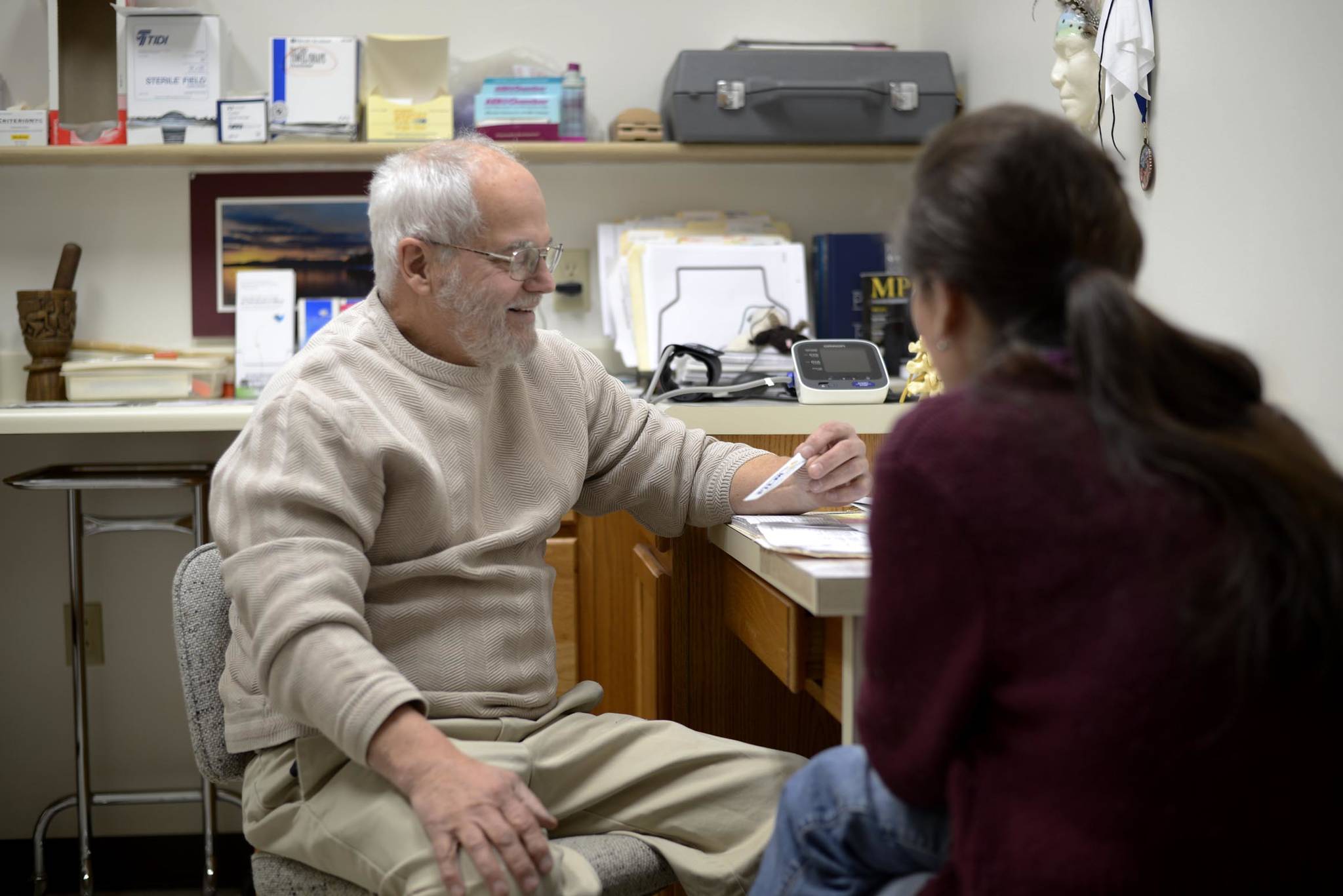A longtime Kenai doctor has sold his practice to a company operating clinics focused on medically assisted opioid treatment.
Ideal Option, a Washington-based health care company, will take over Dr. Michael Merrick’s practice in Kenai effective today. The company focuses on helping people quit using opioids under medical supervision. Medically assisted opioid treatment involves the use of opioid-like drugs, such as Suboxone or buprenorphine, to gradually bring an addicted person down from high usage of drugs like heroin or prescription opiates.
Merrick has been practicing medicine in a small clinic on Frontage Road across from the Kenai Senior Center for about 36 years. Though he provides primary care services, he is also the primary medically assisted opioid treatment physician on the Kenai Peninsula, with around 100 patients. The Drug Enforcement Administration uses a waiver system to limit the number of patients doctors can treat this way.
However, last year, Merrick’s own health took a turn for the worse. He said he was diagnosed with idiopathic pulmonary fibrosis in January, a type of progressive lung disease that gradually reduces a person’s ability to breathe. After hearing about Ideal Option at a medical conference and some consideration, he said he made the decision to sell.
It’s not the last his patients will see of him, though — he said he’ll take some time off and then come back to practice one day a week or so, continuing to see patients as long as his health allows. Ideal Option only takes addiction patients, so his nonaddiction patients will be directed to the Redoubt Medical Clinic, only a few doors down from Merrick’s clinic.
“I’m going to retire more than I am now, but I’m not completely retiring,” he said.
Ideal Option opened its first clinic in Kennewick, Washington in 2012. The co-owners, Jeffrey Allgaier and Kenneth Egli, were both emergency room physicians and saw the need for more medically assisted opioid treatment providers and decided to open their own clinic. Egli, the executive vice president and medical director of the company, said it took off from there, with the company expanding to 27 clinics in seven states, including four in Alaska.
“We’re basically a doctor’s office,” he said. “We do the medical management of addiction. In Washington we do have our own counseling agency.”
The company is a full addiction medicine specialty clinic, treating anyone with a substance abuse disorder or chemical dependency, but has focused particularly on opioids because of the ongoing national crisis of heroin and prescription drug abuse, Egli said.
The clinics work with patients individually to develop treatment plans using both medication and counseling, Egli said. The traditional substance abuse counseling method required in many states, particularly for those on Medicaid, has shown little success, so Ideal Option’s counseling system is based on an individual’s need, he said.
“A lot of our clients (have jobs) — we have lawyers, we have teachers, we have bus drivers, we have nurses, we have engineers, and these folks can’t keep a productive life if they have to sit in six hours of class split up into three days a week,” he said.
One of the barriers to patient access to treatment has been the Drug Enforcement Administration’s waiver system — the first waiver medical providers can obtain is a 30-prescription waiver, which they have to have for a year before applying to the Substance Abuse and Mental Health Administration to expand to 100. Providers just getting started may not want to take on that small of a patient base and may not bother getting the waiver, Egli said.
The DEA has made several changes recently, though. After former president Barack Obama signed the Comprehensive Addiction and Recovery Act in July 2016, nurse practitioners and physician’s assistants were able to apply for the waiver after completing training from 2017–2021, according to the American Society of Addiction Medicine. Physicians practicing in a qualified setting who have had the 100-patient limit can now apply to expand their treatment base to 275.
Egli said Ideal Option is a qualifying center, meeting criteria such as having a nurse on call, providing case management services and using electronic medical records, among other requirements. That allows the practice to take more patients.
“We have always been a qualified practice,” he said. “Our providers can go up to 275 for (medical doctors) and (doctors of osteopathy). As of yet, we don’t know if next year they’ll expand (physician’s assistants) and (nurse practitioners) to 275, but right now we’re happy with 100.”
Ideal Option has expanded with a combination of buying small practices and setting up clinics, Egli said. They’ve targeted states with friendly Medicaid policies — the majority of the clinics’ patients have Medicaid, though they’re also in-network with major private insurers, he said — and are generally welcomed by the communities, he said. Alaska’s medical community has been very welcoming in Anchorage and Fairbanks so far, he said.
“Dr. Merrick has been doing a fabulous job providing service (in Kenai),” he said. “It’s challenging for him to turn the reins over because of this capacity limitation with the buprenorphine waivers. He’s just so insightful and thinking ahead… if you’re going to retire or get sick, there isn’t enough capacity in the area to absorb those patients. We’re already licensed and working in Alaska.”
Merrick said he saw the sale of the clinic as part of the larger picture of privately practicing physicians selling to larger companies nationally. Many private practices have chosen to sell to companies because of the complexity and expense involved in the heavily regulated medical business, particularly in technology and insurance requirements.
Having the terminal diagnosis is something he’s coming to terms with as well.
“This time seemed as good as any,” he said.
Reach Elizabeth Earl at elizabeth.earl@peninsulaclarion.com.

